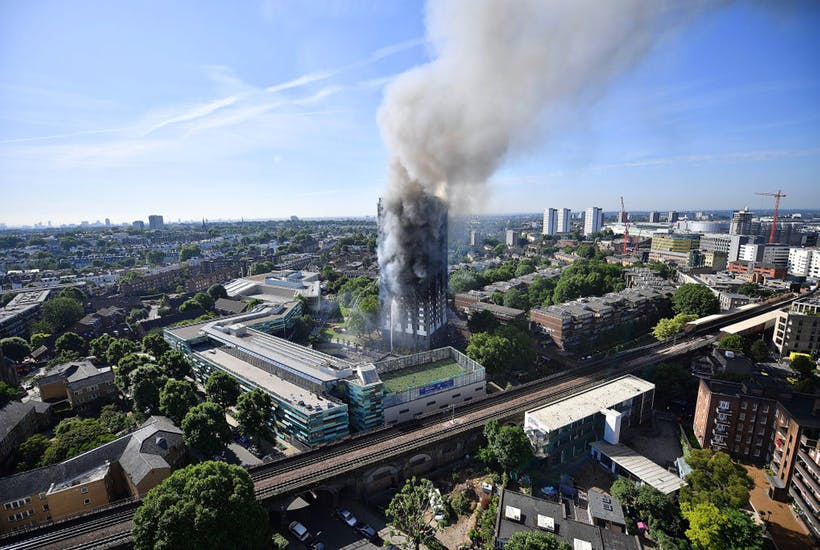Jeremy Corbyn chose to focus his questions to the Prime Minister today on the government’s response to the Grenfell Tower fire. It was the second anniversary last week of that fire, and campaigners have accused the government of not keeping its promises to the survivors of that disaster. The Labour leader asked about the slow progress in removing the same cladding from other buildings that was on the Grenfell Tower, and then moved on to a recommendation made years before the fire that tower blocks should have sprinklers fitted.
That recommendation followed the fire at Lakanal House in 2009 in which six people died. The coroner at that inquest had recommended that sprinklers be fitted to all high-rise buildings. This wasn’t the only inquest after a fire that highlighted problems with tower blocks: after two firefighters were killed in a blaze in Southampton, a coroner issued a rule 43 report, which is supposed to make something examined at an inquest a ‘never again’ event. But there was no compulsion on the government to follow these recommendations. This was something Theresa May pointed out today, telling the Chamber that the report hadn’t said councils should have to fit sprinklers, but that they should consider it. This would sound like splitting hairs even in a less serious situation.
Social housing magazine Inside Housing has carried out an extensive investigation into why the government failed to learn the lessons of the Lakanal fire, which made the spread of the flames at Grenfell more likely. It points out that in 2010, David Cameron announced a ‘one in, one out’ policy for regulations, which was designed to lower the cost of building homes. Even when campaigners pointed out that buildings were now being clad in highly combustible materials, the response from ministers was allegedly that a fire ‘hasn’t happened yet’.
This complacency sounds disgraceful, but it’s easy to see how it could develop undetected in a busy government which was trying to stamp its identity on policy after 13 years of Labour rule. If actions don’t appear to have bad consequences, then it’s easy for someone to carry on without thinking about their long-term effect, and to become convinced that those warning them about fires are just overly agitated.
Today May told the Commons that the Grenfell tenants hadn’t been listened to properly, and that she was taking steps to ensure that this was changing. But the government continues to maintain a position that ‘an appropriate level of fire safety can be achieved without the need to retrofit sprinklers’. So it might be that tenants are able to get their voices heard, but it’s not yet clear that the government really has decided to learn the lessons from Grenfell.
One of those lessons could surely be that coroners’ reports are worth listening to and should perhaps even carry more weight than arbitrary rules about regulations which do not take into account new regulations which could be absolutely necessary, rather than ones about the distance of a bin store from a house and so on. Another might be that even ministers with good intentions can end up developing a blindness on certain policy issues, perhaps as a result of ideological dogma, or perhaps because they wrongly believe that just because there haven’t been any recent fires in buildings clad in combustible material, there will never be any fires. Another might be that just because something isn’t the subject of political pressure, doesn’t mean that it’s not serious. There was insufficient political pressure for things to change after Lakanal, but MPs and campaigners were raising concerns about fire safety and building regulations. In fact, if you look back through Hansard, you will see that every year or so, another backbencher calls a Westminster Hall debate on fears they have unearthed about building regulations coming up short. Yet it’s much harder to find any evidence that ministers have done anything beyond responding politely to that debate.
None of these are easy lessons to learn, as they all involve culture changes as much as they involve the sort of thing a Prime Minister can announce in a press release. It hardly needs saying, though, that this doesn’t make them any less worth learning.







Comments